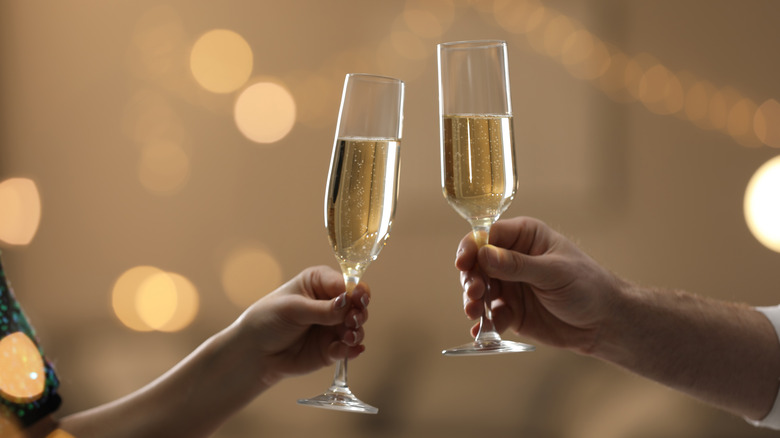Why Champagne Pairs So Well With Steak
Certain traditional food and beverage pairings are etched deeply into the foodie canon. For example, icy cold vodka is the traditional beverage pairing for caviar because vodka's crisp acidity serves as a "perfect palate cleanser," and its subtle flavor allows the caviar's assertive brininess to burst forth, according to Petrossian.
Likewise, red wine is the default accompaniment for steak. There's even science to support it: Red wine, by definition, is rich in tannins, which develop during skin-on fermentation and wood barrel aging, according to Wine Folly. Tannins not only imbue the wine, simultaneously, with both a depth of flavor and an astringent mouthfeel, but they also react chemically with the fats in the meat, breaking them down to release their flavor, according to Steak University. Moreover, as they break down on the tongue, those fats help soften the acidity of the wine, bringing out the wine's more subtle fruits and florals.
Nevertheless, traditional pairings aren't meant to be the only pairings. Just as caviar also pairs as beautifully with Champagne as it does with vodka, per Imperial Caviar, steak also pairs perfectly with the fancy French bubbly, according to many top chefs and beverage pairing experts (via The Independent). But that also begs the question: Since tannins seem to be fundamental to the magic inherent in the pairing of red wine and steak, then how is it that Champagne, which contains almost no tannins at all, according to Decanter, pairs so well with steak?
Champagne's acidity complements the rich steak
If you've never paired your steak with Champagne, you may be missing out, says Lex Madden, bar manager at Denver, Colorado's Point Easy restaurant. "The crispness of Champagne helps to cut through the typical richness of a steak and its accompaniments," Madden told Tasting Table, referring to Champagne's fizziness and its complex flavors, which have been described as fruity, citrusy, and nutty, per Vino Vest. Champagne also complements the various sauces that are typically served with steak, including chimichurri and demiglace.
The same is not necessarily true for all sparkling white wines, however. For example, Madden advises against substituting prosecco for Champagne. "The tart, fruit-forward notes will get in the way of the richness of a steak, rather than complementing it." Recognizing that Champagne's higher price point may be a concern, Madden recommends giving "Cremata de Jura" a try. Generally priced between $15 and $20 per glass in-restaurant, and $50 and $70 in-store, Jura sparkling wine is apparently everything that actual Champagne is, except that it comes from France's Jura Valley instead of from the Champagne region.
"Jura wines have a little more of a bread-y, biscuit quality that pairs nicely," Madden tells Tasting Table. That being said, Madden still maintains that Champagne pairs so well with steak that it may be worth saving up for and trying at least once.

